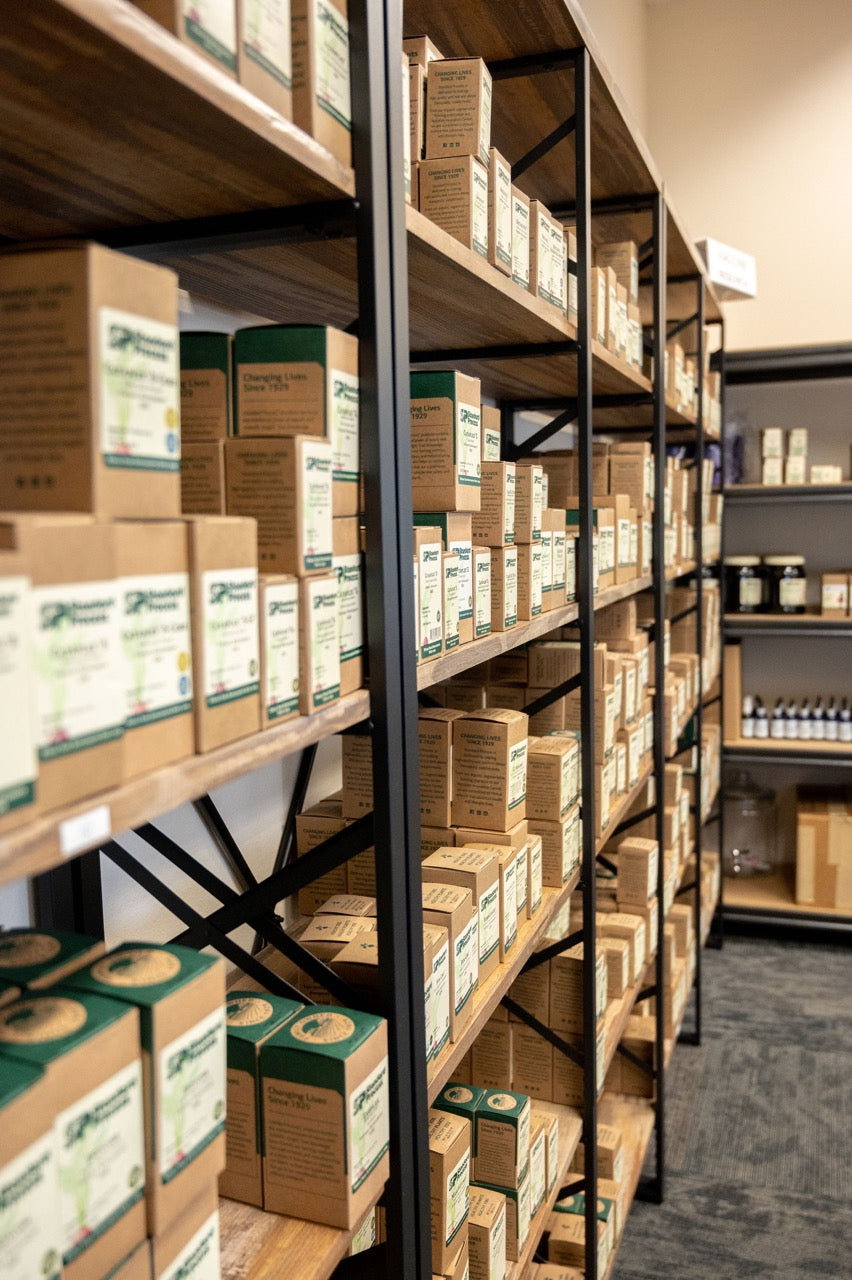Exploring the Meaning and Benefits of Echinacea:
A Powerful Herbal Remedy for Your Immune System
Echinacea is a flowering plant found mainly in North America. Heavily recognized for its medicinal properties, it's been used for centuries in boosting the immune system and treating various ailments. However, what you might not know is Echinacea's prevalent use extends to three specific species: Echinacea purpurea, Echinacea angustifolia, and Echinacea pallida. Each with unique qualities that set them apart in their health-boosting capabilities. Now let's delve deeper...
Echinacea is a genus of herbaceous flowering plants in the daisy family, commonly known as coneflowers. It is often used in herbal remedies and supplements due to its potential immune-boosting properties.

What is Echinacea?
Echinacea is not just any ordinary plant; it's a group of flowering plants that belong to the daisy family. Typically found in eastern and central North America, Echinacea comes in different species, with the most commonly used ones for medicinal purposes being Echinacea purpurea, Echinacea angustifolia, and Echinacea pallida. These beautiful plants have been admired for generations due to their remarkable healing qualities and ability to promote a healthy immune system.
You see, the vibrant purple flowers of Echinacea aren't just visually appealing—they hold tremendous power. These plants contain active compounds such as flavonoids, cichoric acid, and alkamides which contribute to their therapeutic effects. This means that when you use products containing echinacea, such as those offered by Ayana Bio which are infused with Echinacea stem cells, meadowfoam seed oil, cloudberry extract, amino acids, and probiotic bioferments, you're benefiting from a range of natural goodness designed to hydrate and soothe your skin.
Now, it's not just about how they look or what they contain. It's about how they can benefit us. Let's explore the impressive ways that echinacea can positively impact our well-being and contribute to a healthier lifestyle.
Traditional Applications of Echinacea
Echinacea's history is firmly rooted in the traditions of Native American tribes, particularly the Plains Indians, who extensively used echinacea for various purposes. It was employed to alleviate symptoms of respiratory infections, colds, and flu, in addition to topical application for treating wounds, insect bites, and as a general "cure-all" remedy.
Each tribe had its specific methods of preparation and application. For instance, some brewed the roots into a tea, while others created poultices for topical use. This wide-ranging use of echinacea influenced its modern applications in herbal medicine and supplements. The legacy of these traditional uses carries on in the present day, shaping the way echinacea is integrated into contemporary herbal remedies.
The knowledge of Echinacea's benefits traveled beyond native communities with the arrival of European settlers in North America. In the late 19th and early 20th centuries, as they interacted with indigenous peoples, European settlers adopted the use of echinacea into their own herbal traditions.
They recognized and valued the potential medicinal benefits of echinacea, leading to its integration into their own healing practices. As a result, the herb became increasingly popular and well-regarded as an herbal remedy among European settlers and in subsequent generations.
This historical adoption signifies the cross-cultural exchange of knowledge and traditions. The fact that echinacea was integrated into both traditional Native American remedies and those of European settlers speaks to its perceived effectiveness across different cultural and geographical contexts.
The convergence of traditional Native American use with European settler adoption shaped echinacea's trajectory, setting it on a path toward being considered a ubiquitous herbal remedy known for its potential immune-boosting properties.
Health Benefits of Echinacea

Echinacea has long been celebrated as a potent herbal remedy for the immune system. Its documented ability to support the immune system and combat infections and viruses has made it a popular choice for those seeking to bolster their body's natural defenses.
Picture your immune system as an army constantly standing guard, ready to defend you from potential threats. Echinacea acts as reinforcement, helping your army remain vigilant and strong against opposing forces. It's like giving your immune system a helpful boost, especially when faced with challenges like colds, flu, or other infections. This supplement aims to empower and prime your immune system for peak performance.
Imagine Echinacea as a shield, standing between you and the onslaught of seasonal ailments. Every time you take it, you're reinforcing that shield, making it harder for sickness to break through.
In addition to supporting the immune system, Echinacea is believed to possess anti-inflammatory properties that help reduce chronic inflammation in the body. By calming the fires of inflammation within the body, Echinacea may assist in alleviating discomfort and promoting overall well-being.
Moreover, Echinacea is said to harbor antioxidant effects that can protect cells from damage caused by free radicals, thus promoting overall cellular health and warding off oxidative stress.
Think of Echinacea as an extra layer of protection for your body's cells—a shield that defends them against damaging external forces.
These potential benefits underscore the significance of Echinacea in supporting overall health and wellness—whether fortifying the immune system, quelling inflammation, or shielding cells from harm.
Having uncovered the myriad benefits of Echinacea for overall well-being, let's now turn our attention to its specific effects on the immune system.
Echinacea Effects on the Immune System
Echinacea acts like a supersoldier for our immune system, containing special compounds that help our bodies fight off colds and other illnesses. When you feel rundown and like you might be coming down with something, echinacea steps in to the rescue.
The star player in echinacea's immune-boosting team is believed to be its ability to activate chemicals in the body that reduce inflammation. By doing this, it may help to lessen the symptoms of the common cold. Imagine it as a gentle hand that soothes the inflammation within our bodies, or perhaps think of it as a shield that lessens the impact of those pesky cold symptoms we all dread.
Additionally, this marvelous herb also contains alkylamides, which act directly upon our immune system by activating it to respond more effectively to infections. It's like an inspirational coach that motivates your immune system's players to work harder and smarter, ensuring they give their best performance when facing off against any invading viruses or bacteria.
Researchers have suggested that these alkylamides stimulate our body's white blood cells—like soldiers patrolling our system, ready to fight off any foreign invaders. With more active white blood cells on duty, our bodies become better equipped to fend off illnesses.
These crucial components in echinacea have been found in studies to potentially decrease the risk of developing a cold by 58%, shorten the duration of a cold by 1.4 days, and even reduce the severity of cold symptoms. These promising findings suggest that incorporating echinacea into our wellness routines could have significant positive impacts on our overall health and well-being.
Echinacea isn't just a trendy herbal remedy—it's a powerful ally in maintaining a resilient and robust immune system.
Role of Echinacea in Respiratory Health
When it comes to our respiratory system, we all want to breathe easily and comfortably. This is where Echinacea comes into the picture. Traditionally used to alleviate symptoms of various respiratory conditions such as bronchitis, asthma, and the common cold, people have turned to this herbal remedy for generations to gain relief from congested or inflamed airways and to help ease the discomfort associated with these respiratory issues.
The key behind Echinacea's potential in aiding respiratory health lies within its ability to reduce the severity and duration of these conditions. It's like having a trusty ally by your side when you're feeling under the weather. When colds or flu start making their rounds, Echinacea steps in to help you fight back and perhaps even shorten the time you're under the weather.
Imagine having a reliable companion during flu season—a natural source of support right when you need it. That's the potential role of Echinacea when it comes to defending your body against respiratory troubles. It's like having an extra shield to protect yourself from the discomfort that could accompany these conditions.
Respiratory Health Benefits of Echinacea
Let's break down some specific benefits:

But of course, it's always important to consult with a healthcare professional before integrating Echinacea into your routine—especially if you're dealing with a pre-existing respiratory condition or are taking other medications.
In summary, by lending its potential support to our respiratory system, Echinacea can play a beneficial role in helping us navigate through conditions such as bronchitis, asthma, and the common cold.
As we've explored the potential benefits of Echinacea for respiratory health, let's now turn our attention to evidence-based findings regarding its usage.
Guidelines for Echinacea Consumption
Echinacea can be found in various forms - capsules, tablets, and teas. The appropriate dosage varies depending on the form and the specific product used. Because herbal supplements aren't regulated like prescription drugs, it's crucial to be mindful of guidelines to ensure safe and optimal usage.It's imperative for individuals with certain medical conditions or those taking medications to consult their healthcare providers before using Echinacea. This step ensures that it's safe and appropriate for their individual circumstances.
Consulting with a healthcare provider is particularly crucial because some people should avoid using Echinacea according to experts. A healthcare provider can assess individual health situations and identify any potential interactions or contraindications based on an individual's medical history and medication regimen.
In summary, comprehending the proper dosage and form of Echinacea along with consulting healthcare providers equips individuals with the knowledge needed for safe and effective usage. Ensuring proper dosage and seeking expert advice are essential steps toward maximizing the benefits of Echinacea while maintaining safety. It's important to approach its consumption with care and consideration for individual health conditions.






